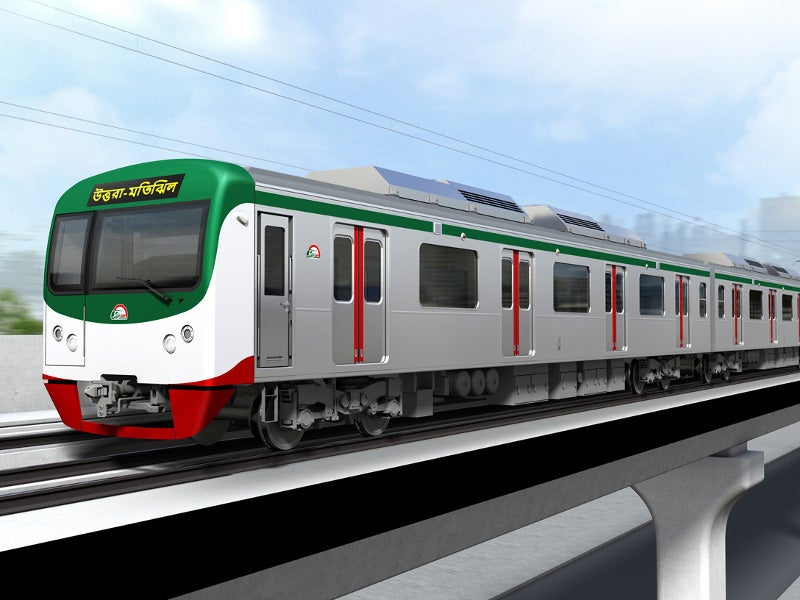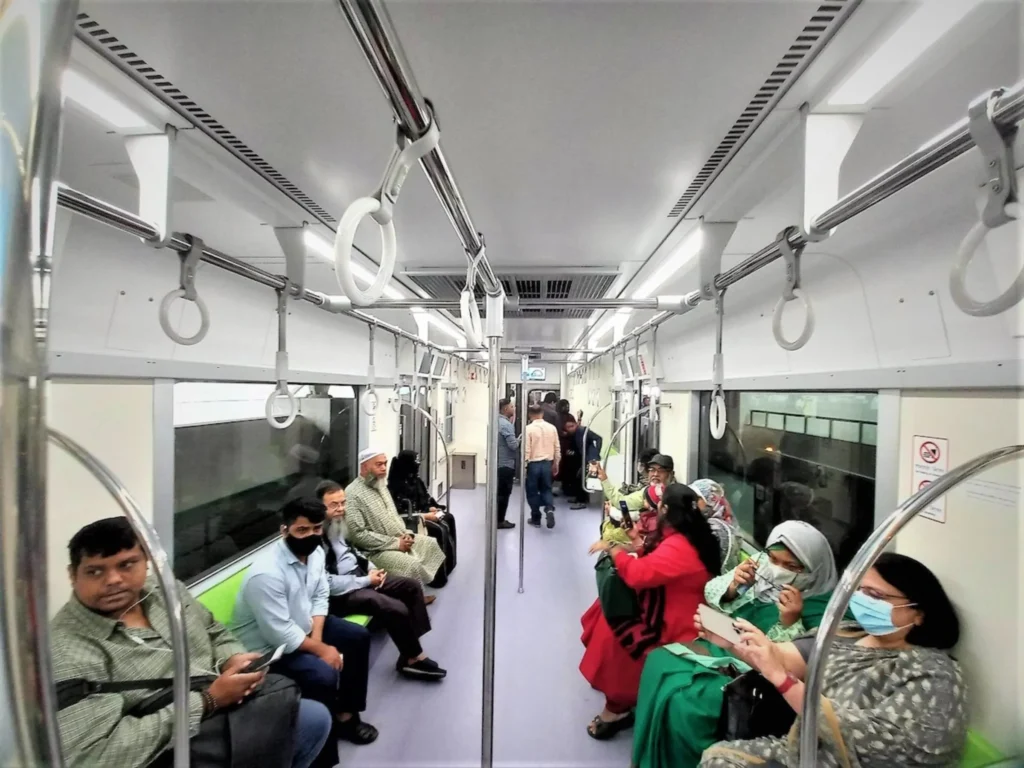Metro Rail Bangladesh aims to revolutionize urban transportation in Dhaka. It promises faster, safer, and more efficient commutes.
Dhaka, the capital of Bangladesh, struggles with severe traffic congestion. Metro Rail Bangladesh offers a groundbreaking solution. Designed to alleviate daily gridlocks, the metro promises to enhance the quality of life for Dhaka residents. It will reduce travel times and improve air quality, making the city more livable.
The metro system, featuring state-of-the-art trains and stations, is a significant step towards modernizing the city’s infrastructure. It also supports economic growth by creating jobs and boosting local businesses. With its launch, Dhaka can expect a future of streamlined and sustainable urban mobility.
Introduction To Metro Rail
The Metro Rail Bangladesh is a significant development in public transportation. It promises to revolutionize travel within Dhaka. This modern transit system aims to reduce traffic congestion. It will also provide a faster, more reliable commuting option.
Historical Background
Metro rail systems have a rich history worldwide. The first metro system began in London in 1863. Since then, many cities have adopted metro rail. These systems have become essential for urban mobility.
In Asian countries, metro rail systems are crucial. Cities like Tokyo, Beijing, and Delhi have extensive networks. These cities have benefited greatly from metro rail. It has improved their public transportation efficiency.
Inception In Bangladesh
The idea of a metro rail in Bangladesh is not new. Discussions began in the early 2000s. The need for a modern transit system was clear. Dhaka’s traffic problems were worsening.
In 2012, the government took concrete steps. They approved the Dhaka Metro Rail project. The project aimed to create a fast, efficient transport system. It would connect key areas of Dhaka.
Construction officially started in 2016. The project is progressing steadily. The first phase is expected to be operational soon. This will mark a new era in Dhaka’s transportation.
| Year | Milestone |
|---|---|
| 2000s | Initial discussions on metro rail in Bangladesh |
| 2012 | Government approval of Dhaka Metro Rail project |
| 2016 | Start of construction |
| 2023 | Expected operational date of the first phase |
The Dhaka Metro Rail will feature modern trains. It will use advanced technology for safety and efficiency. The project aims to ease Dhaka’s notorious traffic jams.
Metro Rail Bangladesh is a game-changer. It will transform daily commuting for millions. The future of Dhaka’s public transport looks promising.
Project Development
The development of the Metro Rail Bangladesh is a monumental task. It involves many stages and collaborative efforts. This section will discuss the project’s planning, funding, and investments.
Planning Stages
The planning stages are crucial for the Metro Rail project. Experts conducted extensive feasibility studies. They analyzed the city’s traffic patterns and population growth. The main aim was to understand the need for a metro system. There were multiple planning phases, including:
- Initial Feasibility Study
- Environmental Impact Assessment
- Route Selection
- Design and Engineering
Each phase required meticulous attention to detail. These stages ensured the project met international standards.
Funding And Investments
Funding and investments are critical for the Metro Rail project. The project required a substantial financial commitment. Various sources contributed to the funding:
| Funding Source | Contribution (in USD) |
|---|---|
| Government of Bangladesh | 2 Billion |
| International Loans | 1.5 Billion |
| Private Investments | 500 Million |
The government played a significant role in securing funds. International loans and private investments also helped. This diversified funding ensured the project’s financial stability.
Construction Phases
The construction of Metro Rail Bangladesh is a groundbreaking project. It aims to ease traffic in Dhaka. This project is divided into several phases. Each phase has its unique milestones.
Initial Construction
The initial construction phase began in 2016. This phase focused on preparatory work. It included land acquisition and site preparation. Many workers were hired for this phase.
- Land acquisition
- Site preparation
- Hiring workers
Work on the first line, MRT Line-6, started soon after. This line runs from Uttara to Motijheel. The initial phase also involved building depots. These depots are crucial for train maintenance.
| Milestone | Details |
|---|---|
| Land Acquisition | Completed in 2017 |
| Site Preparation | Ongoing till 2018 |
| Depot Construction | Started in 2018 |
Current Status
The current status shows significant progress. MRT Line-6 is nearing completion. Stations are being constructed rapidly. The track laying work is also almost complete.
- Station Construction
- Track Laying
- Testing and Commissioning
Modern trains are being tested. Engineers are ensuring safety and efficiency. The project is expected to be operational soon. Citizens are excited about the upcoming launch.
Here is a brief of current milestones:
| Milestone | Status |
|---|---|
| Station Construction | 90% Complete |
| Track Laying | 95% Complete |
| Testing | Ongoing |

Credit: www.tbsnews.net
Technological Advancements
Metro Rail Bangladesh has made significant technological advancements. These improvements ensure a smooth and safe travel experience. Let’s explore the modern infrastructure and safety measures.
Modern Infrastructure
The metro rail system features state-of-the-art infrastructure. Stations are equipped with modern amenities and digital displays. These displays provide real-time updates and announcements.
High-speed trains run on dedicated tracks. These tracks are designed to minimize delays and maximize efficiency. The entire system is energy-efficient, reducing environmental impact.
Below is a table that highlights key infrastructure elements:
| Element | Description |
|---|---|
| Stations | Modern amenities and digital displays |
| Tracks | Dedicated and high-speed |
| Energy Efficiency | Reduced environmental impact |
Safety Measures
Safety is a top priority in the metro rail system. Trains are equipped with advanced safety systems. These systems include automatic braking and collision avoidance.
Stations have CCTV cameras and security personnel. Emergency response teams are always on standby. Passengers can use help points located throughout the stations.
- Advanced safety systems
- CCTV cameras
- Security personnel
- Emergency response teams
- Help points
Environmental Impact
The Metro Rail Bangladesh project represents a significant step forward in urban transportation. It aims to reduce traffic congestion and promote sustainable travel. This section delves into the environmental impact of the Metro Rail.
Sustainability Efforts
Metro Rail Bangladesh incorporates various sustainability efforts to minimize its environmental footprint. The project prioritizes eco-friendly construction practices and materials. The rail system uses renewable energy sources, like solar power, to reduce carbon emissions.
Energy-efficient lighting and automated systems ensure minimal energy waste. The stations feature green roofing and rainwater harvesting systems. These measures help conserve resources and promote a greener environment.
Green Technologies
The Metro Rail employs advanced green technologies to enhance sustainability. Electric trains produce zero emissions, unlike traditional diesel engines. This shift significantly reduces air pollution and improves urban air quality.
Noise pollution is also minimized through the use of sound-dampening materials. Modern signaling systems ensure efficient train operations. This results in reduced energy consumption and lower environmental impact.
| Technology | Environmental Benefit |
|---|---|
| Electric Trains | Zero emissions |
| Solar Panels | Renewable energy |
| Green Roofing | Temperature regulation |
| Rainwater Harvesting | Water conservation |
Metro Rail Bangladesh is a step towards a sustainable future. The integration of green technologies and sustainability efforts showcases a commitment to protecting the environment.
Economic Benefits
The Metro Rail Bangladesh project brings numerous economic benefits. It is transforming the nation’s economy. Let’s explore how this development is positively impacting the local economy.
Job Creation
The Metro Rail project is creating thousands of jobs. It offers employment opportunities in construction, engineering, and maintenance. This influx of jobs is reducing the unemployment rate.
Local workers are being trained to meet the project’s needs. This training helps them gain valuable skills. These skills can be used in future projects.
The project also boosts indirect employment. Jobs in sectors like retail, hospitality, and services are increasing.
Boosting Local Businesses
The Metro Rail is enhancing local business growth. Small businesses near stations are seeing more customers. Increased foot traffic leads to higher sales.
Local markets and shops benefit from the rail’s presence. People can easily travel to different areas. This convenience helps businesses thrive.
The project also encourages new businesses to open. Entrepreneurs see potential in areas connected by the metro.
| Economic Benefit | Description |
|---|---|
| Job Creation | Thousands of new jobs in various sectors |
| Boosting Local Businesses | Increased customer traffic and sales |
| Training Opportunities | Skill development for local workers |
Social Impact
The Metro Rail Bangladesh project is transforming urban life. It brings many social benefits to the people. This section explores the social impact through different angles.
Improving Commutes
Metro Rail Bangladesh is cutting travel times. People now spend less time on the road. This allows them to spend more time with family and friends.
Table:
| Mode of Transport | Average Commute Time (minutes) |
|---|---|
| Metro Rail | 30 |
| Bus | 90 |
| Car | 60 |
Enhancing Quality Of Life
Metro Rail improves air quality by reducing traffic. Fewer cars on the road mean less pollution. This leads to healthier lives for all.
Safety is another benefit. Metro Rail offers a safer mode of transport. It reduces the risk of road accidents.
- Reduced pollution
- Increased safety
- More leisure time
People now have more time for hobbies and exercise. This positively impacts their mental health.
Economic benefits are also significant. Local businesses near metro stations see more customers. This boosts the local economy.
- Cleaner air
- Safer roads
- Stronger local economy
Metro Rail Bangladesh is a game-changer for urban life. It brings many social benefits that improve daily living.

Credit: www.news.cn
Future Prospects
The future of Metro Rail Bangladesh looks promising. It aims to transform urban transportation. This section explores the exciting plans and long-term vision.
Expansion Plans
The government has ambitious plans for metro expansion. The current network will extend to new areas. This will cover more cities and towns.
| Current Lines | Planned Extensions |
|---|---|
| Line 1 | Extending to XYZ Town |
| Line 2 | Adding 10 new stations |
| Line 3 | Connecting ABC City |
New routes will make travel more convenient. They will reduce travel time significantly.
Long-term Vision
The long-term vision includes integrating metro services with other transport modes. This means better connectivity with buses and trains.
- Seamless travel experience
- Reduction in traffic congestion
- Eco-friendly transportation
The metro aims to be environmentally sustainable. It will use green technology and renewable energy sources.
Smart technology will play a key role in the future. This includes real-time tracking and efficient ticketing systems.
The focus is on making travel safe and efficient. This involves upgrading infrastructure and enhancing security measures.
Metro Rail Bangladesh is set to revolutionize urban transport. The future looks bright with these plans.
Challenges And Solutions
The development of the Metro Rail Bangladesh has faced many challenges. From logistical issues to funding problems, the journey has been tough. Yet, innovative solutions have emerged to tackle these obstacles.
Overcoming Hurdles
One major hurdle was land acquisition. The process required careful negotiation with landowners.
Another challenge was funding. Securing enough money required partnerships and loans from international bodies.
Traffic congestion posed another problem. Construction work often disrupted daily traffic flow.
Environmental concerns also needed addressing. Ensuring the project did not harm local ecosystems was essential.
Innovative Approaches
Technological advancements played a key role in solving these issues. Modern machinery sped up construction work.
Public-private partnerships helped in securing the needed funds. Collaborating with private firms brought in additional resources.
To tackle traffic congestion, night-time construction was adopted. This reduced the impact on daily commuters.
Environmental impact assessments were conducted before starting the project. This ensured that the local environment remained protected.
| Challenge | Solution |
|---|---|
| Land Acquisition | Negotiation with landowners |
| Funding | Public-private partnerships |
| Traffic Congestion | Night-time construction |
| Environmental Concerns | Impact assessments |

Credit: www.railway-technology.com
Conclusion
The Metro Rail Bangladesh project promises a transformative impact. It will reduce traffic congestion and boost economic growth. Residents will enjoy faster, more efficient commutes. This modern infrastructure marks a significant step towards a sustainable future. Embrace the change and experience the benefits of Metro Rail Bangladesh.


